By Colette Nichol, Story Strategist and Solo Filmmaker
Estimated reading time: 24 minutes
Time to find an online filmmaking course that’s right for you? Great! This post covers literally everything you need to consider if you want to learn filmmaking and take a great course that will help you achieve your filmmaking dreams.
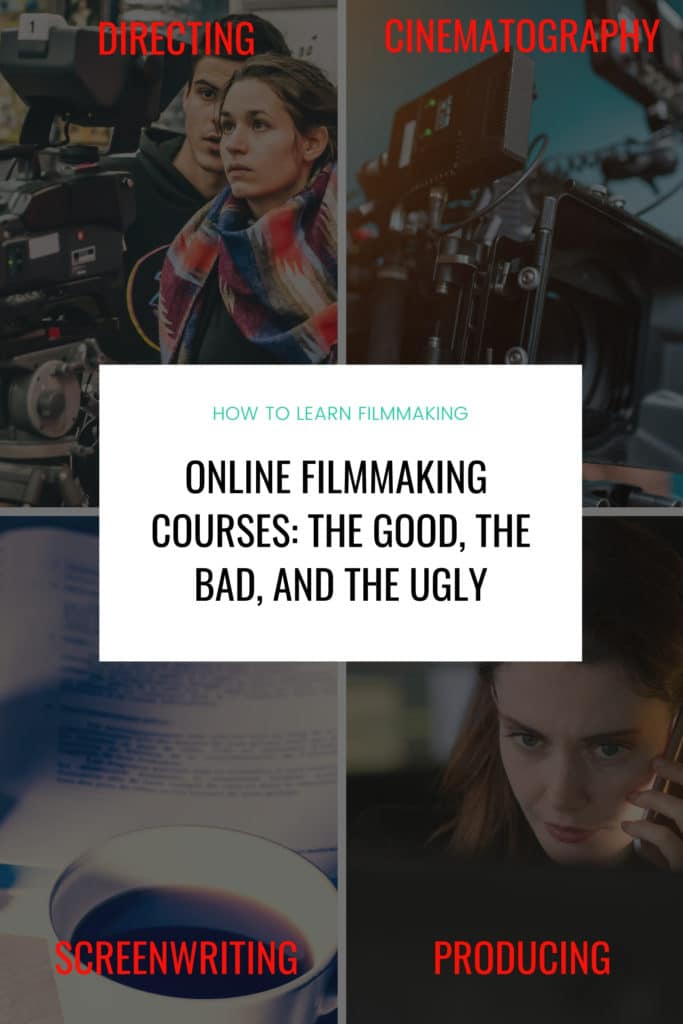
There are a ton of different types of online filmmaking courses. So you need to be specific about what you want to learn, how you want to learn, and what you need to be successful.
Online filmmaking courses range from $10 to $3000 or more. But as you already know, this is a fraction of the cost of learning at a traditional film school. That’ll run you about $50,000 or more in most cases.
But if you’re ready to become a filmmaker and you’re serious about it, then you should decide just based on cost. You should decide based on what is going to help YOU succeed. I suggest you take 20 minutes to go through this whole post before you dive into your next program.
Table of contents
- What kind of Filmmaker do you want to become?
- Filmmaking Training: There’s More Than One Type of Program
- Online Filmmaking Courses—Cheapest vs. Fastest vs. Best
- What’s the BEST way to learn filmmaking?
- Filmmaking Tutorials
- Get Into Filmmaking
- Body of Work
- Online Course Platforms | Udemy vs. Lynda vs. Masterclass vs. Skillshare
- Online Filmmaking Certificate Courses | Do you actually need a certificate?
- Learning Outcomes | What SKILLS do you want to gain?
- What should you be looking for in online filmmaking courses?
- Your Teacher: What matters in a filmmaking teacher?
- Online Lectures Don’t Work for Beginners
- How to Learn Filmmaking
- How to Learn Filmmaking Online
- Online Filmmaking Courses That Are Worth Your Time
- Online Filmmaking Courses (Actually Lectures):
- Learn Filmmaking From One Book
- Gain a Filmmaking Skillset, not Just an Info Dump
- Commonly Asked Questions About Online Filmmaking Courses and How to Learn:
What kind of Filmmaker do you want to become?
Before you jump headfirst into the sea of online filmmaking courses, you must decide what kind of filmmaker you want to become.
Okay, this isn’t set in stone. You can change your mind. But what do you see for yourself in the future?
Maybe, more importantly, how would you like to be using your filmmaking skillset over the next 1, 3 and 5 years? What would you like to be making?
There are many types of filmmakers. Here are some of the options that you should consider when planning your course of learning:
Documentary Feature Filmmaker
Makes documentaries with a small crew or alone. Usually works with a post-production team to finish the film. Often works with a producer to get funding and distribution for the project.
Solo Filmmaker
Make documentaries or narrative shorts alone without a crew. This is how many indie filmmakers begin their journey. You become capable of shooting, editing, lighting, sound recording, storytelling, visual storytelling, and production. Unless you already have access to people who could crew your films and a strong understanding of filmmaking grammar, this is where you should start.
Narrative Feature Filmmaker or Indie Filmmaker
Make feature films either with a big budget or a tiny budget. If you’re working with a big budget and you direct movies but don’t actually know how to shoot or edit, you’re a director, not a filmmaker. Unless you take on multiple roles in a production, you’re not a filmmaker. (Yes, this is my opinion.) If you’re writing, producing, and directing your film, the heck yes, you’re a filmmaker.
Indie filmmakers typically do way more than just write, direct, and produce their films. They often also edit the movie, seek distribution, act as the casting director, and do a million other tiny jobs that an assistant would normally do on a big set.

Wedding Filmmaker
Kinda obvious, no? You make high-end wedding videos that are cinematic, beautiful, and cost big bucks. You need to become a seriously excellent videographer or cinematographer to do this. You can also produce and direct these films and hire out your cinematography and audio.
Corporate Videographer
Anyone who can shoot, light, record audio, and edit into a final piece is a filmmaker. Most people doing corporate videography are actually skilled filmmakers. It’s just one more way to make money using a camera.
Director (no shooting or editing) – Commercial and Narrative
If you just want to direct and you don’t want to learn how to use a camera, then seeking out a directing course will be your best option. Then you’ll want to gain producing skills because to get started, you will need to find a producing partner or start producing your own projects.
Producer (no directing, just producing)
If you’re a producer, you’re in charge of making a project happen. But you also have a substantial vision, and you bring together the creative members of the team who will fulfill that vision. Producers are the lifeblood of the filmmaking industry. Without them, there would be nothing but a bunch of creative chaos.
Music Video Creator (solo filmmaking or crew-based)
In the realm of music video production, you might be a solo filmmaker creating lower-budget films for indie musicians, or you might be a director working with a crew. You could even be a video producer who’s hustling to create a music video on a low budget. I recently watched a video from a filmmaker and director who is early in his career. He was talking about how he made a music video where the budget was so low he ended up putting in his own money. Ouch.
But I also know video production companies in Vancouver who have specialized in making music videos for profit. So there’s a wide range here. But please note that to become a director on a big-budget music video will mean building up a body of work that allows the producer to trust you with their project.
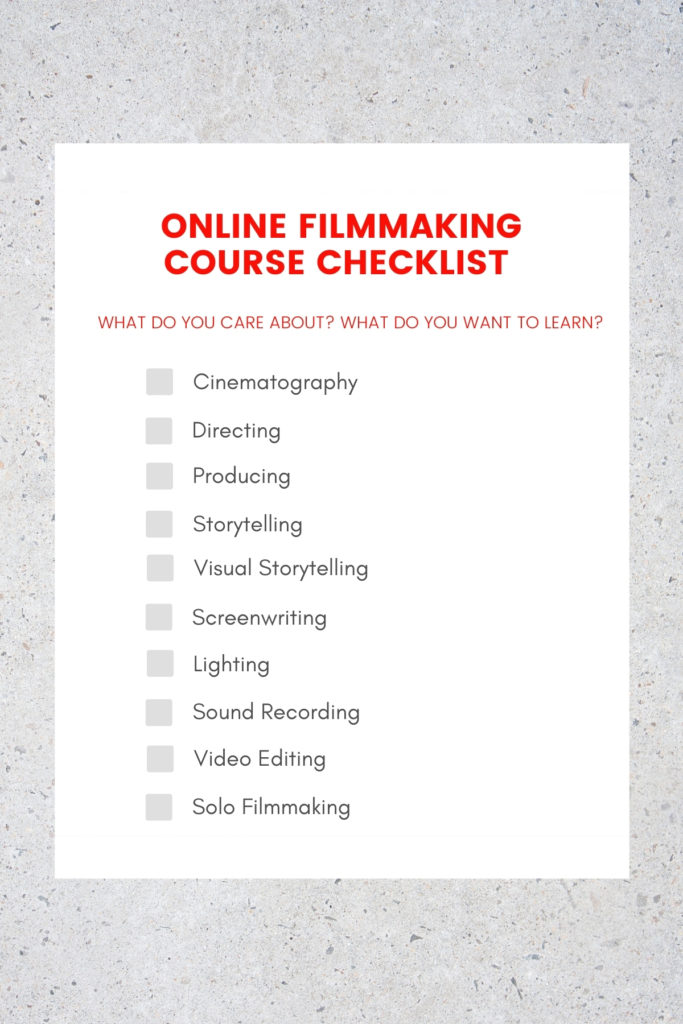
Filmmaking Training: There’s More Than One Type of Program
Some online filmmaking courses and programs are comprehensive.
They’re like a traditional film school. While other programs just give you one-off courses. And then there’s the extremely common lecture-series style course. This is the most common type of course, and it’s also the least effective.
- Comprehensive Programs focused on Crew-Based Filmmaking
- Comprehensive Programs focused on Solo Filmmaking
- One-Off Courses in Various Disciplines, i.e. Make Your Own Film School
Examples: Producing, Cinematography, Screenwriting, Directing, Video Editing, Sound Recording, Lighting - Micro Low Budget Feature Filmmaking
- Solo Filmmaking
- Videography or Video Production or Media Studies
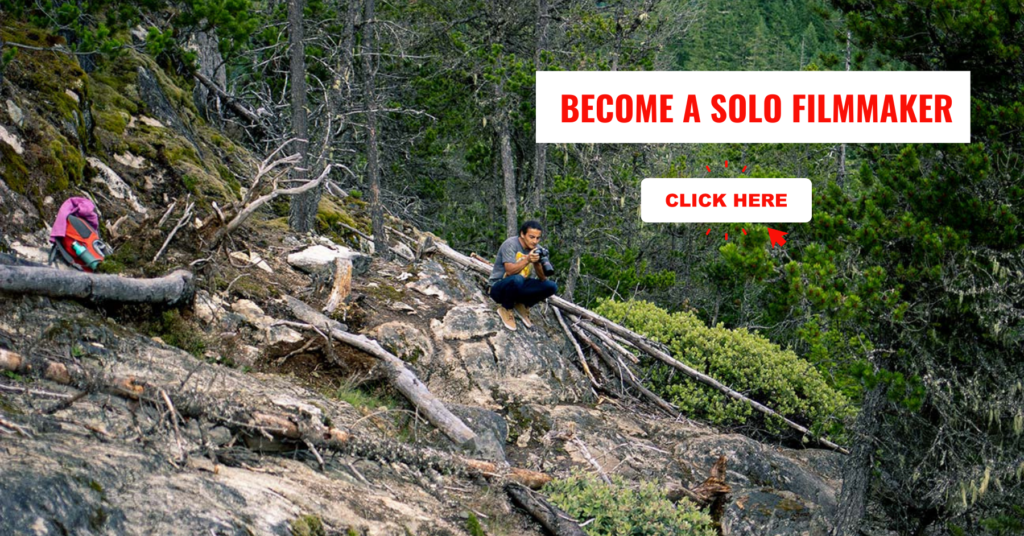
Online Filmmaking Courses—Cheapest vs. Fastest vs. Best
When you start researching online filmmaking courses, you’ll find a ton of courses that cost $15.
If you’re like me, you might be wondering how a $15 course is going to teach you a solid skillset in something as complex as filmmaking. And you wouldn’t be wrong to wonder that. You won’t learn filmmaking from any of those ultra-low-budget courses.
There’s nothing wrong with taking them. Any low-priced course online is a lecture series with no interaction with the teacher or other students. It’s designed to be “consumed” quickly.
Essentially they’re info dumps. Again, nothing wrong with that. But then you need to figure out how to put the info into practice. Also, the information is often quite basic. It doesn’t go into the complexities that are critical to making your filmmaking dreams a reality.
So the cheapest courses can be a primer on filmmaking, but you won’t gain a skillset.
These ultra-affordable courses are also the shortest. But don’t be fooled ’cause they won’t save you time. You’ll still need to come up with a practice strategy and begin making work. You’ll likely also waste a lot of time because you’ll need to put together a ton of courses and tutorials in order to learn everything you need to complete a project.
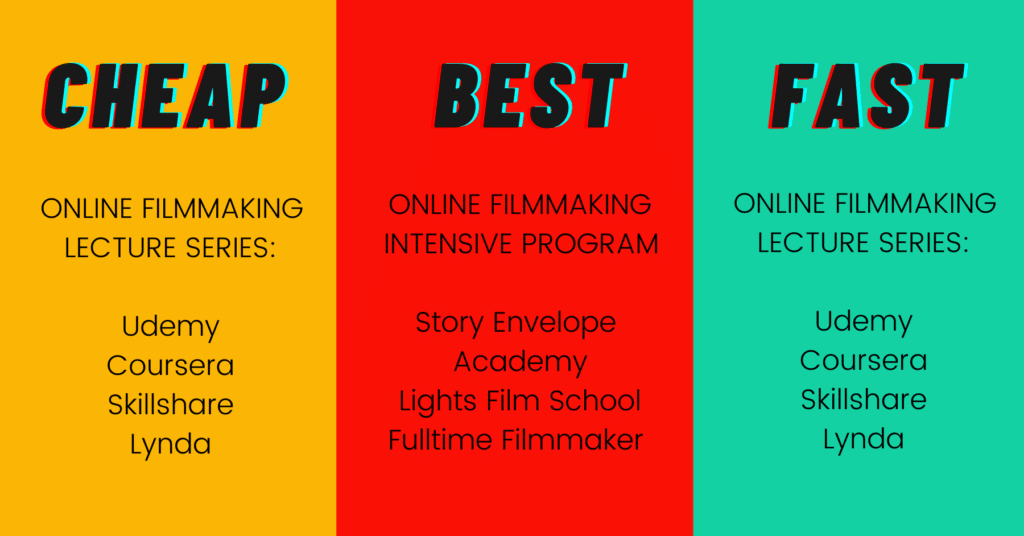
What’s the BEST way to learn filmmaking?
The best way is also the fastest.
You find a program of study that’s comprehensive, project-based, and aimed at helping you gain a skillset. If you know that having interactions with a teacher and other students is helpful to you, then anticipate paying on the “higher” end of the spectrum. Instead of paying $15 for a course, you’ll be paying $750 to $950. For a long-term mentorship program, expect to pay $2000 to $5000.
But, keep in mind that film school will cost you $100,000. You should make your decision based on how serious you are, how quickly you want to gain a skillset, what kind of results you want, whether you need student-teacher interactions to learn, and what your end filmmaking goals are.
Filmmaking Tutorials
The online space is packed to the brim of filmmaking tutorials.
You can watch them for free on YouTube. So why don’t you just learn filmmaking by watching 1000 YouTube videos?
First, many (most!?) of those videos are full of gear sponsorships, so by the end of watching a video, you’ll feel like you need to buy some fancy piece of gear. Second, most online tutorials aren’t aimed at helping you become a filmmaker. They are actually aimed at the online creator community, i.e. videomakers, not filmmakers. A lot of tactics shown in online filmmaking tutorials are only appropriate for a fast-paced, hectic online video about drag racing or booster boarding.
More importantly, when learning from a series of filmmaking tutorials on YouTube, you are open to a million distractions thanks to the YouTube algorithm, which will serve you up videos that will keep you glued to the screen but not necessarily learning anything.
Probably if you’re looking for an Online Filmmaking Course, you already know that.
And can we talk about all the online ads from people who want you to become amazon sellers or get rich by taking their program of the week!? (Am I the only one sick of those ads?)
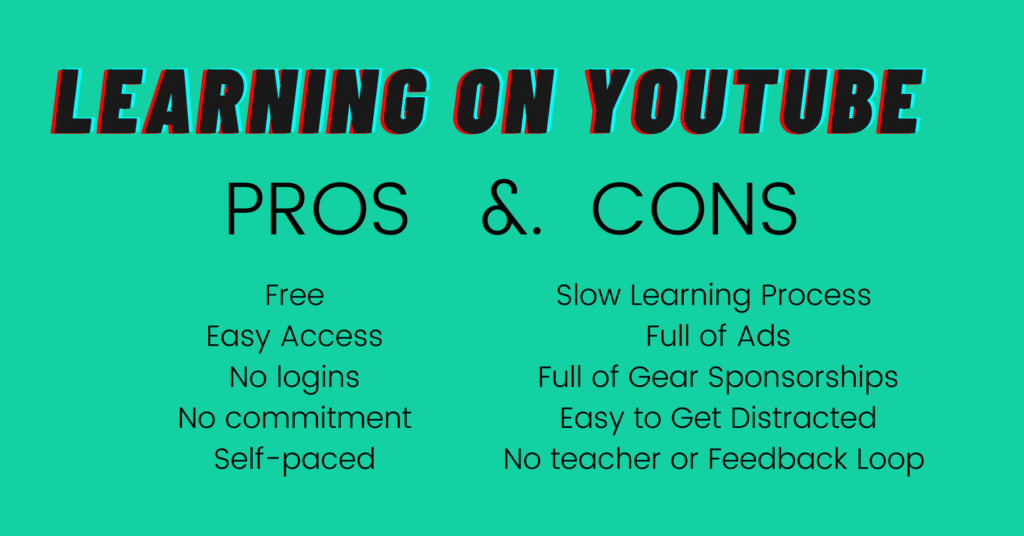
Get Into Filmmaking
So how can you get into filmmaking?
What exactly do you need to do to become a filmmaker? As I mentioned before, this is highly dependant on what type of filmmaker you want to become. If you’re not sure what your hidden filmmaking genius is, then you should take my quiz. It takes about 3 minutes, and by the end, you’ll discover your filmmaker archetype, i.e. which of the four types of filmmakers you are. You’ll also gain access to the gear and strategy guides I’ve made for each filmmaker archetype.
If you already know precisely what type of filmmaker you want to become, then it’s all about your body of work. Filmmaking is an industry and a business. In order to make it your life’s work, you eventually need to earn an income doing this. This means you need a way to get paid.
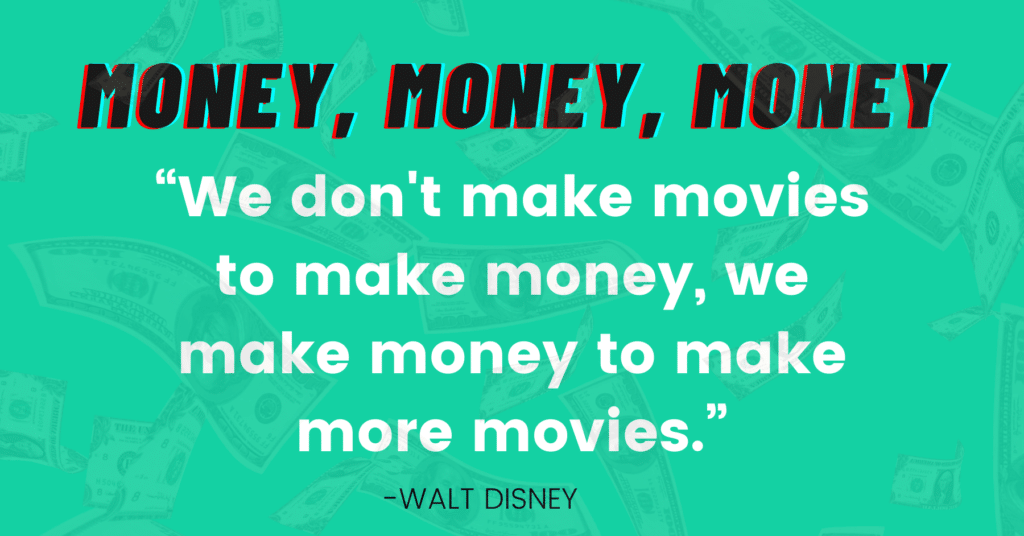
Filmmakers make money in any of the following ways:
- self-fund and self-distribute movies (earn cash through sales)
- get financing from the government or investors and then distribute (hoping to make back the investment)
- create solo films for small brands and get paid as a contractor – you create the proposal and set the price
- get hired by companies to develop and make docu-style films that feature their products (contract work or as an employee)
- build an online audience by making short films about a niche topic that the audience loves and earn income by creating a Patreon with various tiers and also through ad revenue and sponsorships
- create and sell stock footage online
- create and sell LUTs (usually promoted through a YouTube channel)
- teach filmmaking to young people or other aspiring filmmakers (you’ve got to passionate about education as this is not an easy route!)
- become a director for hire and get paid a salary (Hollywood hotshot route – but you usually need to make your first feature or an insanely solid short film before this is going to happen)
- commercial filmmaking like corporate videos, wedding films, real estate videos etc.
These are some of the most common ways filmmakers get paid.
There’s no better or worse way to make money as a filmmaker. In fact, how you want to earn a living as a filmmaker is highly dependent on what makes you comfortable and happy in life.
The thing that is a common thread between every single method of earning a living as a filmmaker is having a body of work.
To learn more about how to make money as a filmmaker, check out the dedicated blog post on that topic.
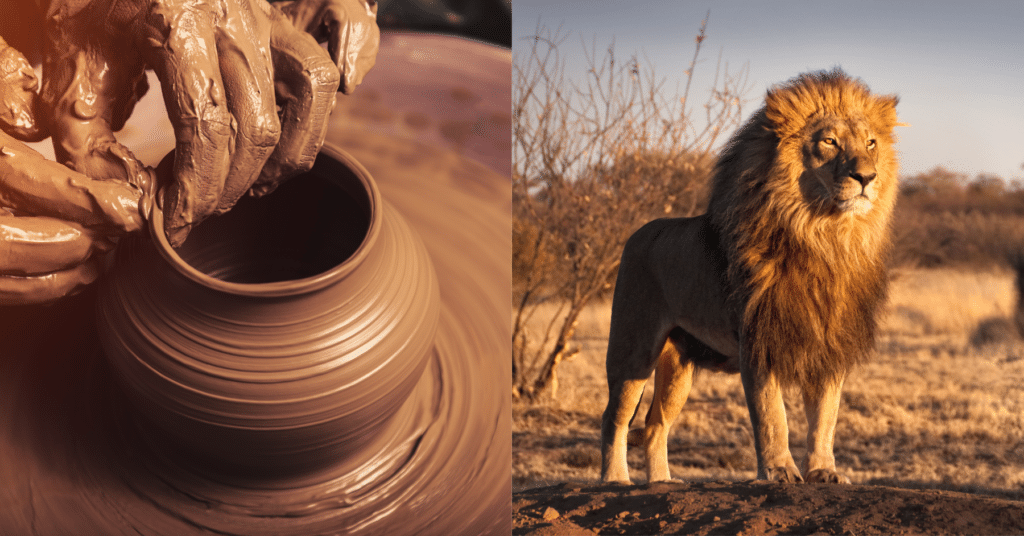
Body of Work
In order to start building a career, business, or legitimacy in the filmmaking world, you need to start creating a body of work. That’s why courses that are just a bunch of lectures aren’t too practical. First, they don’t help you gain a skillset. Second, they don’t help you build your body of work.
And don’t get pulled into the “build your reel” trap. If you think about building your reel, you won’t be thinking like a storyteller and filmmaker anymore. Your reel (series of clips that feature your work) should be a product of your body of work. People usually get hired because of a specific project they completed, not because of their reel.
Building a body of work gives you experience, hones your vision and skills, and helps you to learn more about yourself and what kind of filmmaking you want to do in the future. Just grabbing a bunch of random clips and throwing them into a reel won’t get you very far. I’m not saying this to dissuade you from getting out there and shooting, but rather to help you from getting sucked into the reel trap. Focus on building a body of work, and you’ll gain greater benefits, including getting work, then if you were to focus on a reel.
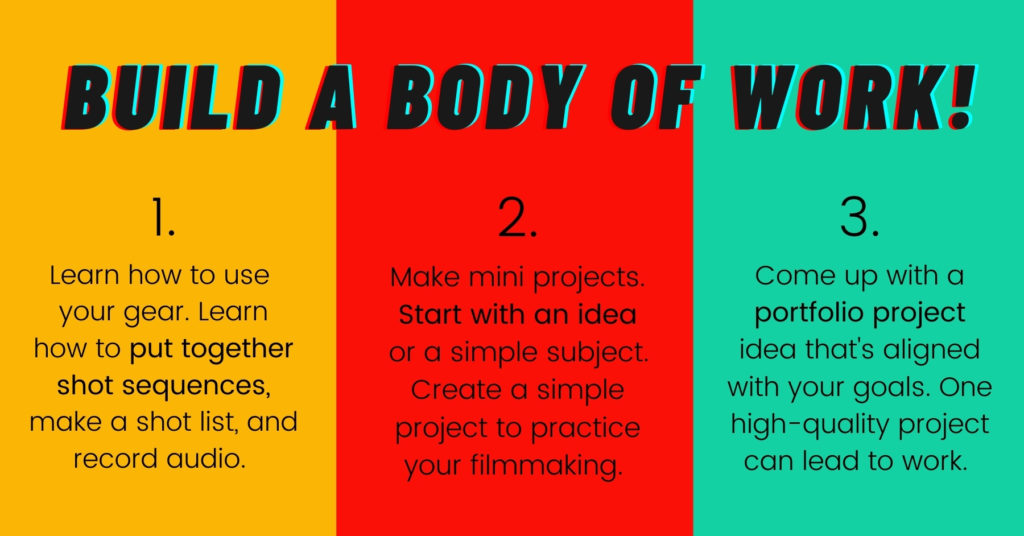
Online Course Platforms | Udemy vs. Lynda vs. Masterclass vs. Skillshare
It’s time to talk about these ubiquitous online learning platforms. Damn, there’s so many of them now! Which should you choose? Should you use any of them?
These online course platforms are most valuable when you need to learn a single, particular skill set, and there’s no other alternative. For example, I learned sound editing from an online course on Lynda.com. I wanted to take a proper course where I had access to the teacher, but I couldn’t find anything. So I was stuck with Lynda.com. The good news is the person who made the sound editing course was serious about their business. They made detailed tutorials, and I learned a lot.
So if you just need to learn something specific and niche, then you simply need to go onto every single platform and see what kind of offerings they have. That said, here’s my breakdown of each platform:
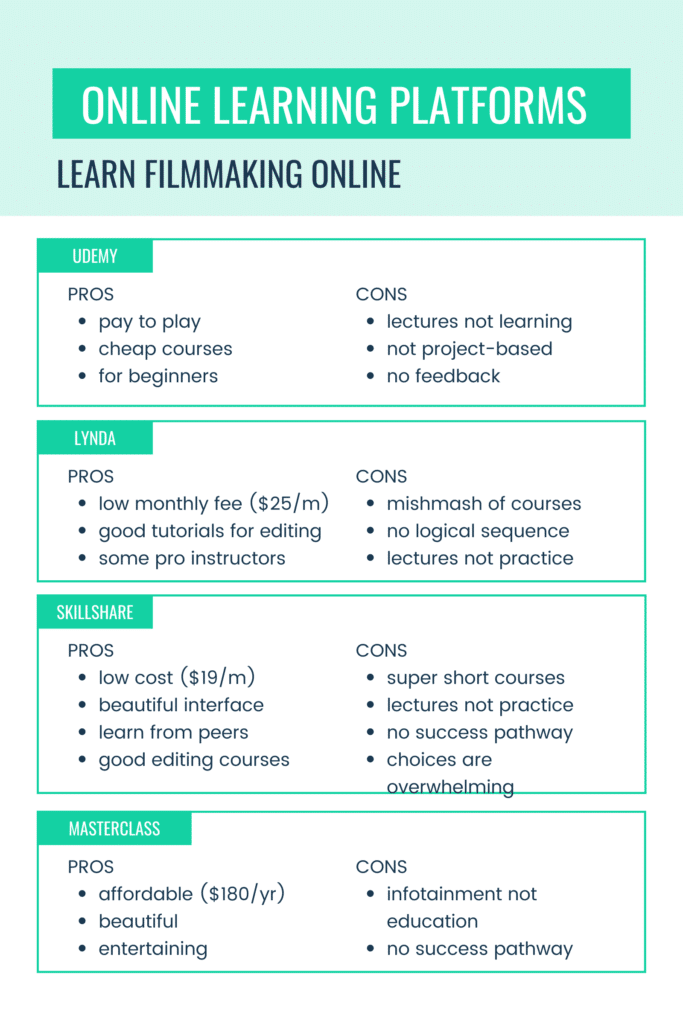
Now, because I love you. Here are the links cued up for you so you can see the suite of filmmaking courses from each of these online platforms:
SKILLSHARE
MASTERCLASS
LYNDA
UDEMY
Online Filmmaking Certificate Courses | Do you actually need a certificate?
No, you don’t.
A certificate won’t get you anywhere. It’s your body of work that will propel your work opportunities as a filmmaker. If you don’t care about getting work and are just doing this for fun or because you have your own indie master plan, then you definitely don’t need a certificate course. In fact, from what I’ve seen of certificate courses online, they are mostly a waste of time. Since they are often made by traditional education institutes, they are usually focused on theory, not practical skills.
You won’t get hired because you have a certificate.
You’ll get hired because of your skills and body of work (and sometimes because of your gear—sad but true).
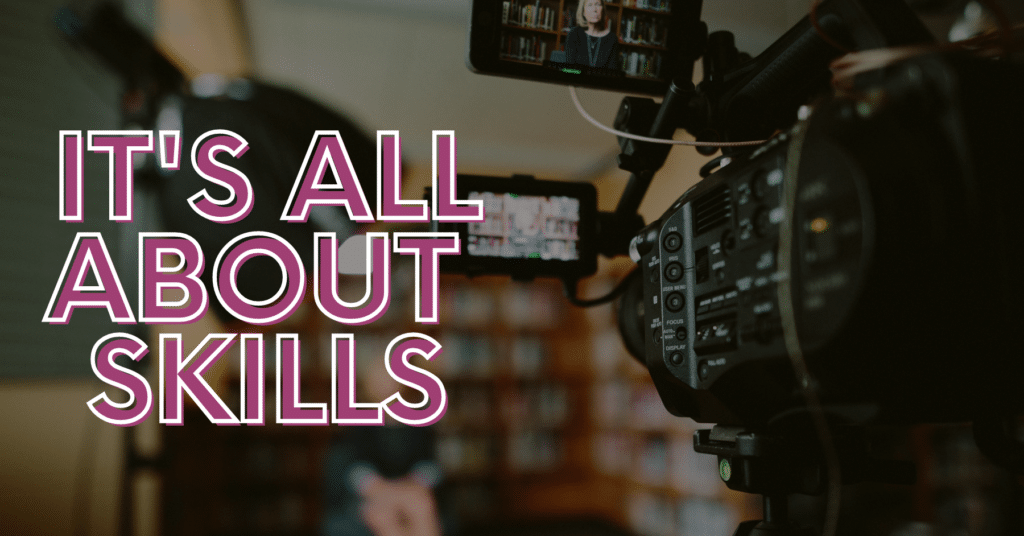
Learning Outcomes | What SKILLS do you want to gain?
The most important thing to consider when looking at online filmmaking courses is what skills you want to gain.
Fancy education institutes often have a section called Learning Outcomes. That’s their boring way of telling you what you can expect to learn. If they just keep repeating the word “understanding” and talk nothing of skillset, then avoid those programs like the damn plague. You won’t learn anything useful.
Write down all the skills you want to gain in order to become a good filmmaker. Then check your list of skills against what the programs are offering.
What should you be looking for in online filmmaking courses?
I know I sound like a broken record, but you need to be looking for a skillset. Is this course going to help you gain a skillset? That’s the primary defining factor of whether a course was designed with helpful learning outcomes in mind or not.
Make sure you learn the following on some basic level:
- shot sequencing
- framing
- video editing
- cinematography or videography
- producing skills
- basic production paperwork
- shot listing
- sound recording
- sound editing
- lighting
- starting a project and taking it to completion
- interviewing
- colour grading
- ideally, learn video editing on Premiere Pro as it’s currently industry standard
You don’t need every single one of these topics in your first filmmaking course. But to successfully start making films, you do need to have some or all of these skills, depending on your trajectory.
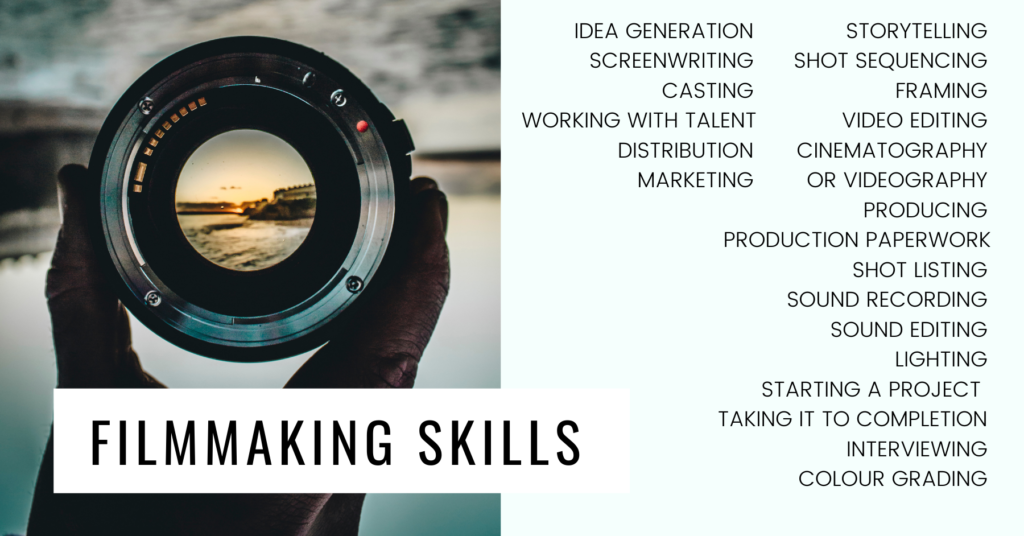
Your Teacher: What matters in a filmmaking teacher?
Above all else, they have to be passionate about teaching and sharing knowledge and seeing you progress.
Teaching is a tough job. In fact, it’s not really a job. Teaching is a vocation.
So if someone isn’t pumped about learning and helping others learn, their program won’t work. There’s plenty of research on education, and we know what’s needed to help people learn. But most people teaching filmmaking online are not basing their programs on pedagogy. Most courses online are based on the infotainment formula. This is not an excellent way to learn. While it might be interesting, you need to put the infotainment into practice if you’re going to advance your skillset.
Online Lectures Don’t Work for Beginners
You can’t learn filmmaking from a 1.5-hour lecture. There, I said it. And I’m sticking to that.
There are thousands of filmmaking lectures online. Some are interesting and inspiring! That’s perfect for giving you a sense of what it WOULD be like to become a filmmaker. But these lectures won’t help you actually BECOME a filmmaker.
Has anyone ever learned how to sing opera or paint a masterpiece by watching a series of lectures? I think not.
Honestly, I wish that weren’t true. I watch every damn lecture on filmmaking if it would make me better at my craft. But, we only learn by ingesting material, practicing what we’ve learned at a small scale, and then stretching to take on bigger projects. We learn by laddering up our skills.
Learn more about how to learn by reading my blog post about how to learn anything.

How to Learn Filmmaking
Understanding how to learn filmmaking will help you choose a course, program, or school that will actually help you gain a filmmaking skillset.
The best way to learn filmmaking is to start small with foundational projects that solidify the basics and then go from there. First, you need to focus on using your camera to frame up your subjects. You need to learn how to shoot so that you don’t have a mess of wobbly unusable footage. You need to practice shot sequencing and creating action sequences. You need to practice basic storytelling. Doing this in black and white is your best course of action because of the complexities of mixed lighting.
Next, you should learn how to use the manual settings on your camera. It’s okay to start out using automatic settings as you practice framing and shot sequencing. But to gain creative control, you need to go manual. Next, you’ll add colour, and you’ll learn about colour temperature and white balancing. You’ll add audio and lighting into the mix. And as you do all of this, you’ll be creating small projects and editing them.
The only way to improve your footage quickly is to edit your own work.
This way you’re putting a critical eye on your footage and asking yourself how you can improve as you go.
Once you have a good handle on shooting, editing, audio, and lighting, you should focus on storytelling and start planning a portfolio project.
In other words, you learn filmmaking by making a series of small projects that increase in difficulty. Then you begin tackling bigger and bigger projects. Any good filmmaking course should be focused on helping you build your body of work.
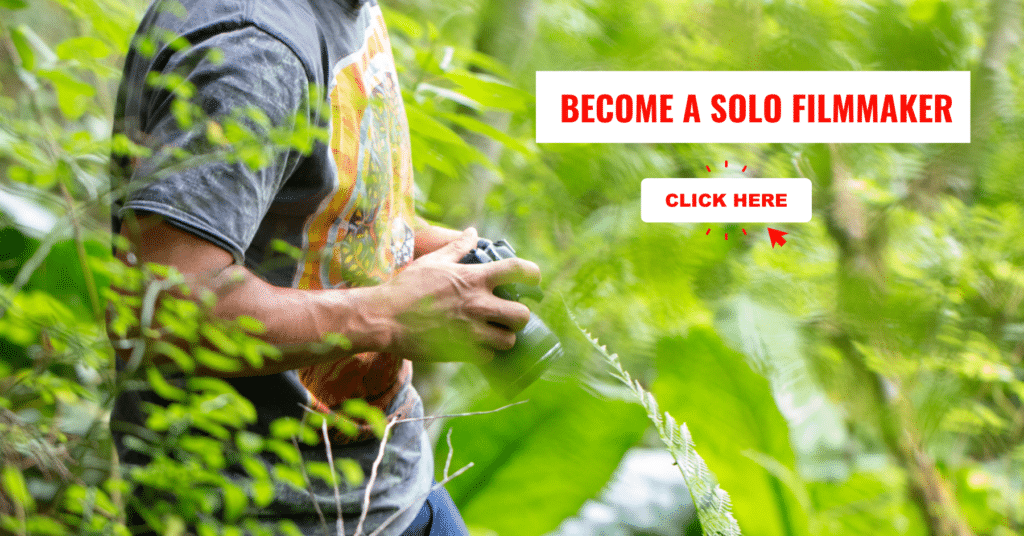
How to Learn Filmmaking Online
The significant difference between learning filmmaking with an in-person course and learning filmmaking online is that you’ll have to use your own gear.
One benefit of traditional film schools is that you can use their high-end gear. This does depend on the film school as I’ve heard of schools that don’t let you touch anything but a low-end camera for the first two years. Some film schools don’t even let you handle a damn camera until year four. But I digress.
So learning filmmaking online simply means that you need to slowly start building up your gear or using rentals. It also means that you’ll have to be more committed than the students who lock themselves into an in-person program. Learning in-person creates a much higher level of expectation because of the high cost and the fact that you have to rearrange your entire life to take the program.
Thus, you’re probably less likely to slack off and not do the work if you join an in-person course (maybe).
That said, some of the most dedicated and prolific creatives I know didn’t go to film school and often take online courses. So if you’re committed to learning, then you can undoubtedly learn filmmaking online.
Open yourself up to the idea of occasionally renting gear in order to try out new things. And be okay with starting out practicing with your own low-end gear. You can use a $250 camera to learn the basics of filmmaking —no problem.
As with any learning, the critical element of learning filmmaking online is whether or not you start and finish your filmmaking projects. You have to be following project-based learning if you expect to walk away with a filmmaking skillset.
Want to learn how I got paid to learn filmmaking? Read more here ->
Online Filmmaking Courses That Are Worth Your Time
While I do teach filmmaking and have created an online course to help creatives become solo filmmakers, I don’t think my course is necessarily perfect for everyone. So I’ve broken down some of the top courses and who they’re for.
Story Envelope Academy 12-Week Solo Filmmaking Course
LEARN: Solo Filmmaking, Editing, Producing, Foundations of Filmmaking, DSLR Cinematography, Lighting Basics, Sound Basics, Focused on Learning by Making Documentari
Fulltime Filmmaker
LEARN: Commercial Videomaking
Indie Film Hustle
LEARN: Indie Filmmaking. If you’re ready to pull together a budget and a crew and you want to get started making indie features, this is for you. Just be aware that if you don’t know your way around a camera yet or don’t have a network, this is an arduous route.
It’s nearly impossible to find an editor who will edit your indie feature for free. Most indie film directors are also editors, and many are also shooters. I’m not telling you, “don’t do this.” I’m saying, be prepared for a struggle. A big one. It’s often a better idea to start our shooting a ton of small things before you tackle a feature.
Moreover, if you’ve never spent time using a camera and honing your vision, it’ll be hard for you to direct a film. We learn through iteration. It’s challenging to iterate when you’re doing massive projects right out of the gates.
But, if you’re okay with allathat, then Indie Film Hustle is a good option.
Online Filmmaking Courses (Actually Lectures):
Dandan Liu’s Courses on Skillshare
Chad Perkins on Lynda.com
Learn Filmmaking From One Book
If you want the cheapest way to learn filmmaking on earth, just read Filmmaker’s Handbook from cover to cover. Even if you just read some key chapters, this will give you way more helpful information than most online filmmaking lectures. It also has the added benefit of being an incredible resource that you can study.
Naturally, you don’t learn filmmaking by just reading a book. You then have to go and put what you’ve read into practice. You need to grab your camera, pick a story idea, and shoot a film. You need to get started shooting, lighting, editing, capturing sound, and practicing basic production skills.
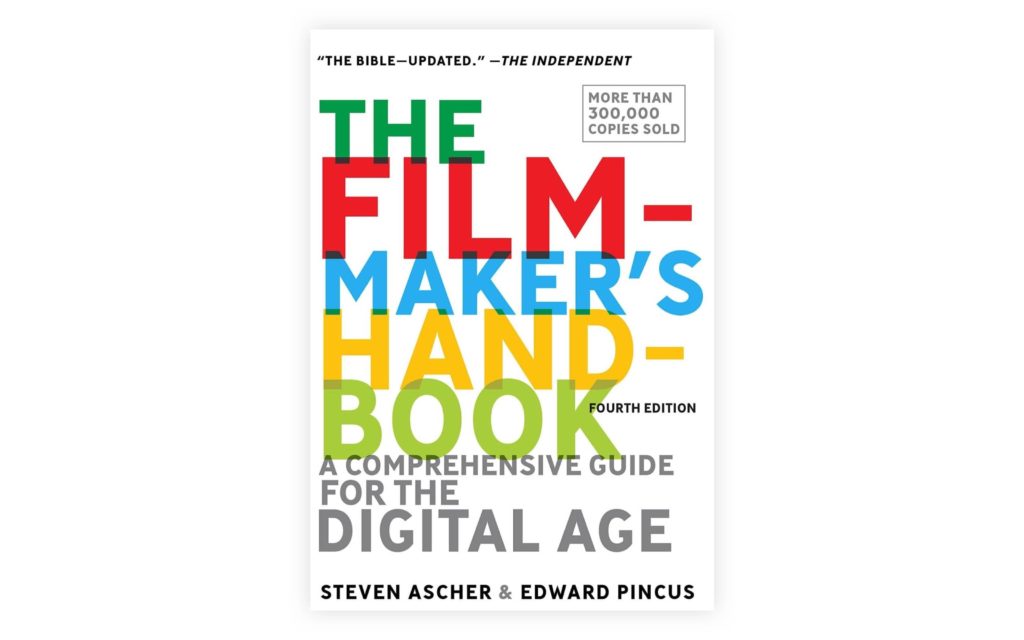
Gain a Filmmaking Skillset, not Just an Info Dump
I’ve watched plenty of online filmmaking lectures.
Mostly I do this for fun because I like to see what other people are teaching. I also sometimes pick up a nugget that I didn’t know or wouldn’t have considered. If I were going to make a feature, I’d definitely watch some lecture series on feature filmmaking and take notes.
But you can’t learn filmmaking from a lecture series.
You learn filmmaking through a strategic process of project-based learning that ladders up your skills. You learn a simple skill and then practice it with a project. Then you add another skill to the mix and do another project. You keep adding skills and adding complexity, and doing small projects. When you do this, you are actually learning a skill. You begin to change the way you think. You integrate the information into your mind and body so that it becomes knowledge. You start building your filmmaking intuition. In order to become an effective filmmaker, you must integrate your learning over time. You turn information into practical knowledge. And you do this by practicing.
Imagine if someone decided they wanted to learn singing. They decided that to learn singing, they would simply watch a lot of videos of people singing. Then they would watch a lot of videos of teachers talking about singing. They would never learn. You can’t learn any creative art form without DOING. Putting a man on Mars may be possible, but learning without doing is not possible.
So whatever you do, make sure your filmmaking program of study is project-based learning that allows you to be constantly practicing your craft and building up your skills.

Commonly Asked Questions About Online Filmmaking Courses and How to Learn:
Learning filmmaking online is no different from learning filmmaking offline. You need to focus on project-based learning and building a skillset through practice.
Learning filmmaking at home is more difficult than being able to go out and film projects in your community. However, you can practice by filming yourself, your pets, and your family members. Anybody you have access to can act as your talent and your subjects. The key is to focus on practicing your shot sequences and framing.
What course you should take to become a filmmaker depends on your end goal. If you want to become a feature film director, you may have a different trajectory than someone who wants to travel the world making docs. Either way, learning a basic filmmaking skillset is important. Taking a filmmaking course that focuses on solo filmmaking will allow you to build this basic skillset.
There are three four places you can learning filmmaking: online learning platforms, online filmmaking academies and schools, colleges, and universities. You need to decide whether learning in person or online is better for you. From there, decide how much time you have to dedicate to a program and how quickly you’d like to learn. The more intensive the program, the more quickly you’ll gain a filmmaking skillset.
Learn Filmmaking and Get the Gear Guide
If you’re interested in learning filmmaking, check out the Solo Filmmaking Mentorship Program I created for aspiring filmmakers and video creators. It usually goes live once per year. So I recommend getting the Story Envelope Filmmaking letter which comes out a couple of times per month. That way, you can get filmmaking tips for free and find out when the filmmaking course is going live again.
Also, before you go, grab the Solo Filmmaking Gear Guide and Checklist for Beginners.

About the Author
Hi! I’m Colette Nichol. I’m a solo filmmaker and story strategist based out of rainy Vancouver, Canada. I’ve been making videos and micro films for small businesses and global brands since 2014.
Plus, I LOVE to help aspiring filmmakers pursue their dreams and start making films. This blog is designed to help you gain the knowledge you need to become a filmmaker.
If you want more, get on the waitlist for the Story Envelope Academy Solo Filmmaking Mentorship Program. It opens up one time per year and is the best way to become a filmmaking or video pro fast!
CLICK HERE to get on the solo filmmaking mentorship waitlist.